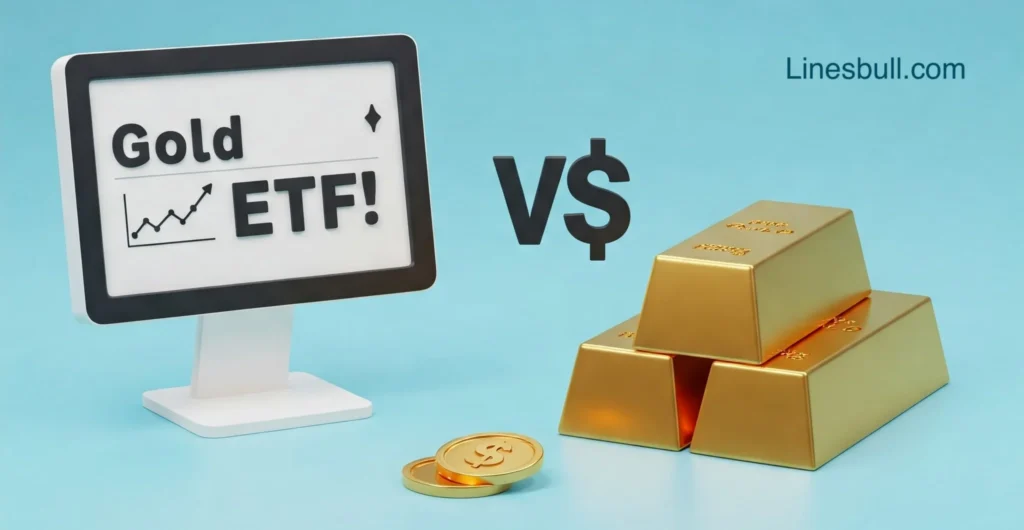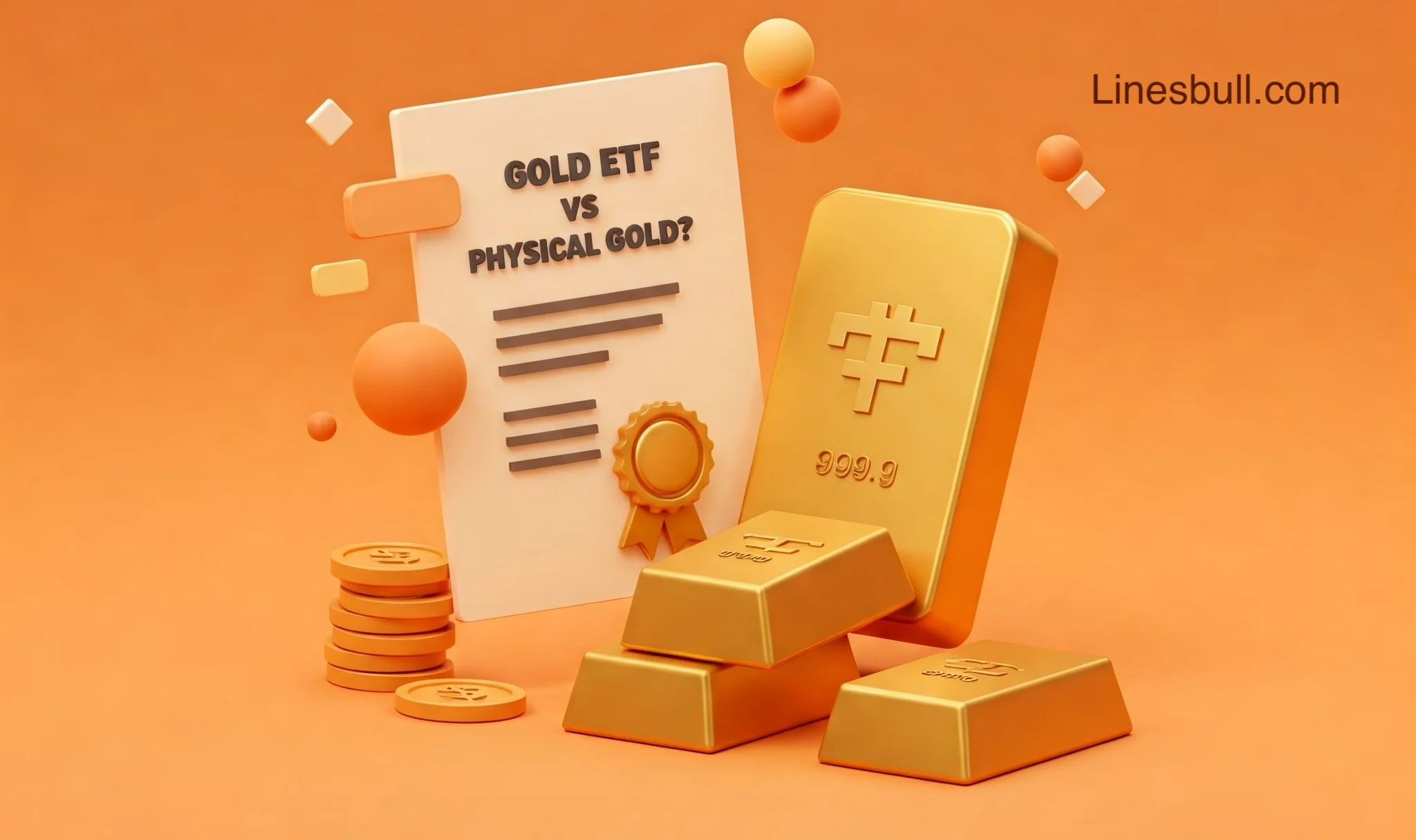Introduction
Gold has always been a trusted investment option, especially during economic uncertainties. But with multiple ways to invest in gold, the big question arises—should you invest in a Gold ETF or buy physical gold? If you’re wondering, which gold ETF is best in India, the US, or Canada?, or which is the best performing gold ETF?, this guide will help you decide.
Gold has always been a trusted asset for investors. Whether it’s a hedge against inflation or a safe haven during market volatility, gold remains a popular investment. But should you invest in physical gold or go for Gold ETFs (Exchange-Traded Funds)?
In this article, we’ll break down the pros and cons of Gold ETFs vs physical gold, helping you decide which option suits your investment goals.
Why Invest in Gold?
Gold has been used as a store of value for centuries. But why do investors still prefer it today?
- Hedge against inflation – Gold prices tend to rise when inflation is high.
- Store of value – Unlike currencies, gold doesn’t lose its intrinsic worth over time.
- Portfolio diversification – It helps balance risk in an investment portfolio.
Types of Gold Investments
Gold investments come in different forms, but the two most popular ones are:
- Physical Gold – Gold coins, bars, and jewelry.
- Gold ETFs – Gold-backed funds traded on the stock market.

What is a Gold ETF?
A Gold ETF (Exchange-Traded Fund) is a financial product that tracks gold prices and is traded on stock exchanges like any other stock. Instead of buying physical gold, investors own gold-backed units in a dematerialized (electronic) form.
Advantages and disadvantages of investing in Gold ETFs
| Aspect | Advantages of Gold ETFs ✅ | Disadvantages of Gold ETFs ❌ |
|---|---|---|
| Liquidity | Easy to buy and sell on stock exchanges. | Subject to market fluctuations, may not always sell at the desired price. |
| Storage & Security | No need to store or secure physical gold. | No direct ownership of physical gold. |
| Investment Cost | Lower cost with no making charges or storage fees. | Management fees apply annually. |
| Convenience | Can be traded online with a brokerage account. | Requires an active trading account. |
| Returns & Performance | Often provides returns closer to actual gold prices. | Prices can be influenced by market demand, not just gold value. |
| Ownership & Control | Indirect ownership with professional fund management. | Investors don’t have physical access to the gold. |
| Tax Efficiency | More tax-efficient compared to physical gold in some regions. | Subject to capital gains tax on selling. |
| Minimum Investment | Can invest in small amounts, unlike buying physical gold bars. | No sentimental or cultural value like physical gold. |
What is Physical Gold Investment?
Physical gold includes buying gold jewelry, coins, or bars that you can store personally or in a bank locker. It has sentimental and investment value but comes with storage risks.
Forms of Physical Gold
- Gold Coins – Popular among small investors, easy to store.
- Gold Bars – Typically used for bulk investments.
- Gold Jewelry – Has cultural and sentimental value but comes with high making charges.
Advantages of Physical Gold
✅ Tangible Asset – You own a real, physical piece of gold.
✅ No Counterparty Risk – No reliance on financial institutions.
✅ Cultural & Emotional Value – Jewelry holds traditional significance.
Disadvantages of Physical Gold
❌ Storage & Security Issues – You need a safe place to keep it.
❌ Lack of Liquidity – Selling can take time and involve extra costs.
❌ Premium & Making Charges – Jewelry, in particular, comes with added costs.
Gold ETF vs Physical Gold: Key Differences
| Feature | Gold ETF | Physical Gold |
| Storage | No storage required | Needs secure storage |
| Liquidity | High (easy to buy/sell) | Low (difficult to liquidate) |
| Purity | 99.5% pure (regulated) | May vary |
| Cost | Low expense ratio | High making & storage costs |
| Tax Benefits | No GST, low capital gains tax | 3% GST on purchase |
Benefits of Owning Physical Gold
- Can Be Used Personally: Jewelry and coins hold aesthetic and cultural value.
- No Dependency on Stock Market: Independent of market crashes.
- Good for Emergency Liquidation: Easily sold at local jewelers.
Which Gold ETF is Best in India?
Some of the top-performing Gold ETFs in India are:
- Nippon India Gold ETF
- HDFC Gold ETF
- ICICI Prudential Gold ETF
- SBI Gold ETF
Best Gold ETFs to Invest in the US & Canada
For international investors, here are the top Gold ETFs:
- SPDR Gold Shares (GLD) – USA
- iShares Gold Trust (IAU) – USA
- Sprott Physical Gold Trust (PHYS) – Canada

Advantages and Disadvantages of Gold ETFs vs Physical Gold
| Factor | Gold ETF ✅ | Physical Gold ✅ |
|---|---|---|
| Liquidity | Highly liquid, easy to buy and sell on exchanges. | Less liquid, selling takes time and may involve additional costs. |
| Storage & Security | No storage required, managed by fund providers. | Requires safe storage (locker, vault, insurance). |
| Investment Cost | Lower cost, no making charges or storage fees. | Higher cost due to making charges, premiums, and storage. |
| Ownership | Indirect ownership through fund shares. | Full ownership of a physical asset. |
| Counterparty Risk | Risk depends on the financial institution managing the ETF. | No counterparty risk; you physically own the gold. |
| Market Dependency | ETF prices fluctuate with the stock market. | Gold’s price depends on global demand and supply. |
| Ease of Investment | Simple to buy and sell via a brokerage account. | Requires visiting a jeweler, bank, or dealer. |
| Returns & Appreciation | Can generate returns through trading. | Gains value over time but isn’t as easily tradable. |
| Divisibility | Can buy in small units (as low as 1 gram). | Harder to divide, must sell in whole units (coins, bars). |
| Sentimental & Cultural Value | No cultural or emotional attachment. | Preferred for weddings, gifts, and traditions. |
| Taxation | Subject to capital gains tax; lower than physical gold in some cases. | Attracts higher taxes on long-term capital gains. |
| Management Fees | Annual expense ratio applies (usually 0.5%-1%). |
Which Gold Investment is Better for You?
Invest in Gold ETFs if:
✔️ You want to own tangible gold.
✔️ You don’t mind storage and security concerns.
✔️ You prefer a long-term investment.
Invest in Physical Gold if:
✔️ You want easy buying and selling.
✔️ You prefer low costs and no storage issues.
✔️ You are looking for a short-to-medium-term investment.
Conclusion
Gold remains a reliable investment, but choosing between Gold ETFs vs physical gold depends on your goals.
- If you want a tangible asset, go for physical gold.
- If you prefer liquidity and lower costs, Gold ETFs are the way to go.
- A mix of both can help diversify your portfolio.
FAQs
1. Is physical gold better than a Gold ETF for long-term investment?
Physical gold is better for long-term holding as it doesn’t rely on market fluctuations.
2. How can I buy a Gold ETF?
You can buy Gold ETFs through a brokerage account on the stock exchange.
3. What are the risks of investing in physical gold?
Storage risks, theft, and lack of liquidity are major concerns.
4. Do Gold ETFs pay dividends?
No, Gold ETFs do not provide dividends.
5. Can I convert my Gold ETF to physical gold?
Some funds offer this option, but it depends on the provider.


